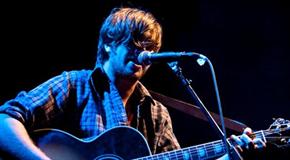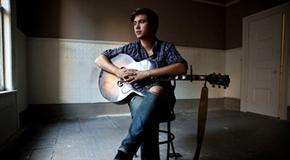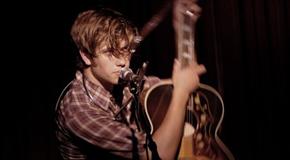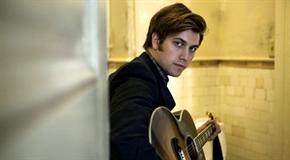Catching Up With Bobby Long
But life could have turned out differently for the musician whose influences range from Irish folk tunes to Bob Dylan. With dreams of becoming a soccer star, Long didn’t pick up the guitar until his late teens, yet his songwriting displays a depth and maturity rarely heard in novice artists.
Long begins a tour opening for Michael Franti Oct. 18 in Lexington, Ky. Currently living in New York City, he recently talked to Pollstar about his influences, his DIY recordings and the making of his first studio album, A Winter Tale, giving us a glimpse into what it’s like to be an artist on the rise.

Has it seemed that your life has been like a roller coaster ride during the past couple of years; from recording songs in your bedroom and playing London clubs to having a song placed in a major motion picture to recording an album?
Yeah, it has a little bit. I’ve taken in stride. It has been a little chaotic, but in a good way. I haven’t been dragged around or put on exhibition or [gone] against my own will. I always felt in control.
You graduated from London Metropolitan University where you wrote a thesis on folk music. Has the last couple years of recording and touring changed your outlook regarding the genre?
No, not at all. I think one of the things I have realized is, what it was in the ‘60s isn’t quite what it’s like now. [Folk music] isn’t as big a part of society now as I think it was for a few years.
I’ve been to the places I’ve written about, into clubs where the people I had written about had played in. So I had a picture to go with what I knew. I wasn’t just writing about something. I’ve been there, I’ve been in the atmosphere. I can picture it better.
Who are some of your personal favorites from that era?
I like Bob Dylan a lot. Richie Havens, some Donovan stuff, Peter, Paul & Mary, Pete Seeger. I like a little of everything. I like Ramblin’ Jack Elliott a lot.
Living in New York, do you spend much time in Greenwich Village?
Very much so. I was at the Bitter End a few days ago. The Clancy Brothers played there, Dylan played and wrote a few songs there.
I played Club Passim in [Cambridge], another famous club. Richard Thompson, Joni Mitchell and Dylan played there.
But I’m not trying to start [folk music] up again. I’m not waiting for someone to blow a whistle and everyone to walk in and take their harmonicas out.
A member of my family visited. We both love the music from that time and the history behind it. So going to those places, especially to the Bitter End, was really cool.
Considering the music that you’ve already released, do you feel the upcoming studio album is your first real album? Or do you think of it in terms of your second or third album?
I don’t view them (previous releases) as anything, really. I definitely don’t view them as releases. They weren’t sold online, just at my shows. I guess I view them as little EPs or collections of songs. They’re my bread-and-butter and help pay for my food and transportation.
Most other artists on the road are trying to sell T-shirts or whatever. I played at these places where I could make live records. I didn’t really count them as anything. I think my album release in January will be my first official one.
It was always weird when people looked at those songs critically. And I was like, “Oh, Jesus Christ…” It wasn’t that I was ashamed of them, but before you release anything you should at least know you’re going to do a live album and there will be mistakes. Prepare for it.
For the two live things I did, I wasn’t really prepared. It was just, “Oh, we can record it. Oh, great.”
So my first record will be the studio record coming out in January.

Considering that your past recordings were pretty much DIY efforts, was it difficult going into a studio and working with a producer and other musicians?
It was definitely something I was really, really worried about. I was just hoping they’d understand me and take the music seriously. I felt a bit insecure about it. But it was really amazing. It really opened my eyes to how good it can be playing with people. But there’s still an element of DIY in it.
Sound wise, we recorded on tape. We didn’t do it digitally. It was all analog. Like vinyl, we picked up the clicks, pops and stuff. We also did it live, allowing for mistakes. That added character.
It wasn’t DIY like we were all around one microphone. But we played live in one room together. There’s bleeding on every mic. Then the producer comes in and mixes it.
Say we did four takes and chose one. Each take was different, had something different about it.
Saying every take was different is a reminder that when songs are released, the version the public hears isn’t necessarily the only version of the song. Do you feel that once the album comes out that you’ll be locked into performing the songs as recorded? Or will you at times perform different versions of the songs?
I think it’s cool to have a band version and an acoustic version. I like that idea. But you’ve got a responsibility to the audience, if you recorded it one way, to play it that way. That’s what they paid their money to see. If you’ve got a song that’s a hit, and you change it around, I don’t think that really makes sense. If you’re doing a cover, and you want to spice it up, that’s different. I like the idea of keeping it how the record was.
You can write any song you like if you put your mind to it. The recording really should be the definition of that song. The version that you choose should be the one you give to people.
Springsteen does some interesting stuff. Dylan, too. He’s done things like changing a song from a waltz. I do like that.

Was
That an artist of his caliber is involved, I think it’s a big deal, but it wasn’t one of my major decisions. I haven’t had the pleasure of meeting him. I did play a festival with him. Matthews and the band are really incredible. I’m really proud to be associated with him but he wasn’t one of the many reasons. ATO is such a nice, friendly label. Maybe that’s where it stems from, that he’s involved from the top. They leave the artists to do what they want to do – what they do best.
Many artists describe their passion for music as a life-long dream. Was that true for you as well? Or was music something that came later in life?
I didn’t start playing guitar until I was 17 and I immediately fell in love with it. My family is really musical. I think I would have gotten into it sooner, but I was almost rebelling against the idea.
I didn’t have to walk more than 10 yards to hear someone playing something. Sometimes you have to let yourself fall into something rather than forcing yourself.
Where did you see yourself before you became interested in music?
I wanted to be a soccer player. I wanted to play English football, but that didn’t work out. I never wanted to be something like a teacher, bank clerk or a lawyer. I wanted to be a soccer player but it quickly turned into wanting to be a musician. There was nothing in between.
I wanted to go into marine biology at one stage, but I wasn’t very good at biology. I just liked watching shark programs and reading books about sharks.
Do you still play soccer?
Yeah, sometimes. But it’s kind of intimidating now. You’re in New York and you see all these guys playing. And I’ll be honest, I’m better at it than they are. I grew up with it, [and] I’m English as well. I have to say that.
When you’re young you ask if you can play. But I’m too frightened to say that. So I just hang around on the outside waiting for someone to ask me.
Me and a musician friend went down and watched the whole day. On the second day we managed to get involved.
When you’re home by yourself, and you’re not writing songs or rehearsing for a gig, do you still play just for the joy of it?
Yeah, I do. I love it. I annoy everyone who comes to my flat because I’m always playing.
What do you play to amuse yourself?
Old songs. I play a little Irish, actually. The Clancy Brothers, “Finnegan’s Wake.” The Pogues. My grandparents are Irish. I play a lot of Neil Young stuff, too. I plug in my electric and play “Alabama.”
Who would you like to see cover your songs?
I hadn’t thought of that. I’d love to see some interest in them. The people I’d love to see cover them are already great songwriters and they wouldn’t need to play one of my songs, unless they really wanted to do it.
But I’d love to see Tom Waits cover one of my songs. But he’s written many great songs so why would he want to do one of mine?

Was having one of your songs in “Twilight” a life-changer?
I wouldn’t say it changed my life but it definitely gave me opportunities. I always wanted to work hard and do well, knowing that if I did so, I could step up.
What was one of the first signs that your immediate universe had changed?
It was weird. Just before the [film’s] release I was doing a show in London and the soundcheck got announced. I had played this bar like 20 times.
I went there and it was packed, about 150 people. And my friends were saying they had just been in the subway or sandwich store and they heard people talking about me. Then I started to panic because I hadn’t rehearsed and I thought I should have written new songs for the night. I felt myself getting stared at.
After the show there was a queue to come meet me. It was really weird, confusing and uncomfortable.
Then waking up one day and going from 20 plays on MySpace go up to 2,500. And when I walked in the sound guy was like, “What the bloody hell happened? What’s changed?”
I played there a lot and it’s really hard to drag people to shows all the time. The most friends I could get to come at any time was five. So I walked in and something seemed to have changed. It was great, but at the same time it was weird.
Many songwriters are also voracious readers. Is that true with you?
Yeah. I have attention problems so I very rarely get to finish. But I have several books on the go on my reader. I’m reading “Dracula” right now. I’m reading “The Plague” by Albert Camus, one of my favorite authors. I’m also reading Nick Drake’s biography. I do try to read a lot. I have a Kindle and I’ll read about 20 pages of one book and then go, “I think I should read this other one for a while.”
What would you tell aspiring musicians who are recording songs in their own bedrooms?
I’d tell them to keep it simple. The best thing about being a musician is you have time. You have time to write better songs and get better. The most important thing is to make sure that when opportunity comes you’re in a good enough position to grab it.
Recording needs to be simple, too. No one has to hear Dark Side Of The Moon or Abbey Road straight away from an artist. There’s plenty of time for development. Whether that brings thousands of dollars, provides a living or just allows you to grow, that’s a good thing.

Currently playing a series of dates in Germany, Bobby Long begins a tour supporting Michael Franti Oct. 18 in Lexington, Ky., at Buster’s. Other dates with Franti include Oct. 19 at Newport Music Hall in Columbus, Ohio; Oct. 20 at Bluebird Nightclub in Bloomington, Ind. and Oct. 22 at Madison Theater in Covington, Ky. Other stops include Terminal 5 in New York City Oct. 28; two nights at the Calvin Theater in Northampton, Mass., Nov. 1-2; Metropolis in Montreal Montreal Nov. 10 and the Kool Haus in Toronto Nov. 12. For more information, click here for Bobby Long’s MySpace page and here for the artist’s website.
 Daily Pulse
Subscribe
Daily Pulse
Subscribe

